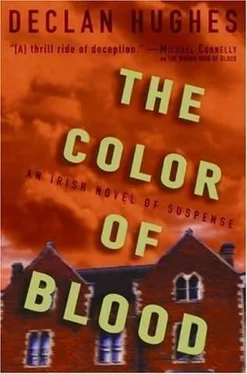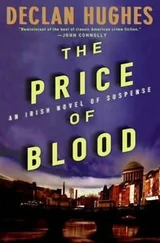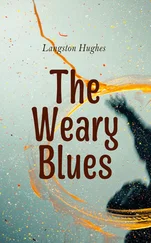“I was away at university, they couldn’t get hold of me, left messages at the college, with my tutor, at the flat…I was having a lost weekend, actually, hidden away, getting in touch with what I had just discovered was my sexuality. So when I got the message…my roommates put up posters all over the town…when I finally found out my father had died, I was full of guilt and shame for not being around, and so of course I blamed myself for being gay. Then I blamed him for making me gay. And my mother, for dying, and Sandra, for being beautiful and capable, it was all their fault that I was gay and therefore my father died. It was all about me, in other words.”
“So you don’t know, was he in hospital, or-”
“Yes, he was out somewhere, taken ill, rushed to the Howard Clinic with a suspected heart attack. I know the doctor who treated him-I’ve interviewed him a few times on politics of health-care issues, he’s a very sound bloke, progressive.”
Martha was summoning up a number on her phone.
“A progressive who works in a private clinic?”
“Ah here, if you judged Irish doctors’ politics by public and private, you’d be in trouble.”
“Somehow, I thought from the tone of your articles, you might.”
“Oh yes indeed. ‘Somehow, I thought all you socialists would live on rice and sleep in tents and give the rest of your money to the poor.’ Ready for the revolution, but it ain’t here yet, baby.”
She strode down the bar, speaking into her phone.
I called Tommy, who said he was coming down Dawson Street. I told him I’d be waiting on Fleet Street. Martha O’Connor came back.
“I’ve just spoken to him. He has a break in half an hour, he’ll talk to you then. Mr. James Morgan, Consultant Cardiologist. I told him what it was about.”
She turned and caught sight of herself in the mirror behind the bar, pulled a despairing face and looked at the floor.
“When I left after my father’s funeral, I swore it was the end. And a fresh start. That meant no contact, trying not even to think about any of it. Good luck with your lives, let me get on with mine. Even with Morgan, I never asked him about my father’s last hours. Last night, the murders, all the coverage of the Howard family, Rowan House-it’s just opened it all up again. Like it never really ended, like it’s unfinished business.”
“That’s exactly what it is.”
A text message announced itself on Martha’s phone.
“I have to go, I’ve a pain-in-the-arse sub questioning copy for tomorrow.”
We walked out into the night. A bus advertising some green fizzy drink loomed queasily in front of us. At the traffic lights, a drunken woman in a skimpy red dress was roaring abuse at her equally drunk partner.
“Martha, do you see your brother Jonathan?” I said. “Your half brother, I suppose is more accurate.”
“I try,” she said. “I barely know him. But I’ve called, and written…I wrote him a note when he got Schol. He never replies. He…sad but true to say, he just doesn’t want to know.”
“I think…I think he could do with a friend at the moment. He’s in trouble.”
“What kind of trouble?”
I didn’t say. But I said he was in his rooms, tonight, and she said she’d think about it. She didn’t look like she’d anywhere else to go. And I was worried about the kid, as much because of how I’d treated him as anything else. The abusive woman at the lights had started to punch her partner in the face; he deflected this after a fashion by twisting to one side, so the barrage rained on the back of his head.
Martha turned to me, tears suddenly in her eyes.
“What do you think happened? Fuck, I’m a mess now.”
“I’m sorry. I would be too. I don’t know. I really don’t know. But I will find out. And then I’ll tell you.”
She wiped her eyes, and forced another of those cheerful good-girl smiles out.
“It won’t just be about me, by then. Tell the world, Ed Loy. Tell the world.”
I watched her walk down the street, her head bowed, and knew she had stored up all the pain to relive on her own, that she would continue to do so, whether I got to the truth or not. As she vanished through the night door of her newspaper’s offices, the drunk man on the corner had had enough of being punched in the head by his girlfriend; he raised his long arm high above her, then seemed to think better of it, turned and sprinted past me. As the woman subsided to the wet ground in howling sobs, Tommy Owens drove the racing green Volvo 122S up alongside me.
TOMMY OFFERED TO DRIVE. I WASN’T FEELING THE DRINKSI’d had, but I’d had a few, so I said okay, even if penitent Tommy on his best behavior was faintly unnerving. He had changed his clothes for an old biker jacket and jeans and black Reeboks; clean-shaven and with short hair, he looked like his own long-lost brother, the one who worked in IT and read science fiction on the weekends. We drove south to the Howard Clinic. On the way, David Manuel called.
“I’d like to see you.”
“What is it? Did Emily tell you something?”
“I think she told me a lot of things.”
“What kind of things?”
“I can’t really explain over the phone. Let’s just say, it’s looking like thirty years ago is the more significant date in the Howard family.”
“What does that mean?”
“I can’t explain, I’m between clients; I had to shift three appointments so I could see Emily again tonight. I’ll be free at eleven.”
“I’ll be there.”
At the Howard Clinic, I gave Mr. Morgan’s name at the security barrier. We drove up through some pretty landscaped gardens and parked near the first white circular tower. It reminded me of the rotunda in Rowan House, and I wondered if all three towers were modeled on it. The towers rose one behind the other, and you could see the turrets of Rowan House overlooking it all. The castle looked like a fabrication, like a Hollywood set, with the modern bungalow in front an actors’ trailer. Drifts of fog were blowing in again, like smoke from a machine; north and east, the city lights were cloaked in a shimmering grey blanket; the horns in the bay blared their clarion call.
The Howard Clinic had tasteful canvases and an atrium with an indoor fountain and an aquarium and glass elevators and all the other stuff upscale private hospitals had to make the patients, whom they thought of as customers, feel they were really getting their money’s worth. You felt like asking where the bar was; at least, I did. I passed a portrait of Dr. John Howard with dark hair and a pipe in his mouth and took the elevator to the sixth level, where Morgan’s offices were. All the other suites were dark; a light was on in his. He was sitting in the waiting room, and I sat down opposite him.
“Sorry if this is a bit cloak-and-dagger. I’d just prefer if word didn’t get out that I spoke to you,” he said in a soft, musical Northern accent, Donegal or rural Derry.
“I am working for Sandra Howard,” I said.
“Yes. Well. I still…this is not something she necessarily might like to be brought to public attention. So I’ll trust to your discretion.”
Mr. James Morgan, Consultant Cardiologist, was in his late thirties, with boyish blond hair thinning on top and deep pink farmboy cheeks; he wore a grey slacks and navy blazer combination, a striped shirt and matching tie and black tassel loafers. I had the sense he’d been wearing the same clothes for twenty years, and would go on wearing them another thirty, and would never notice what color or style they were. He had a manila file on his lap. He looked excited.
“Go on. About Dr. Richard O’Connor.”
“Yes. First of all, the fact that he was diabetic…but this appears nowhere on the records. Even though he worked here, he had never received treatment at this hospital. I wasn’t even aware of it until tonight, when Martha called.”
Читать дальше










